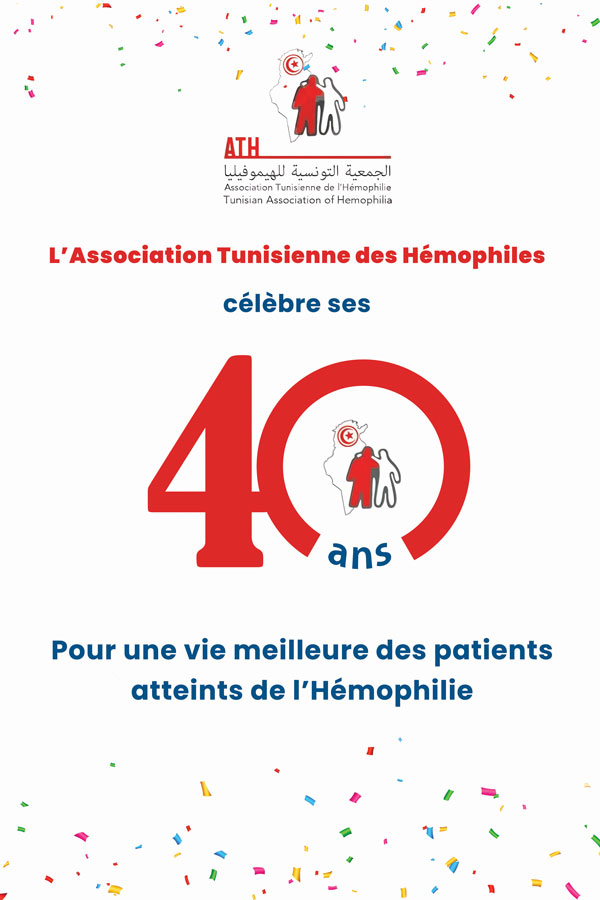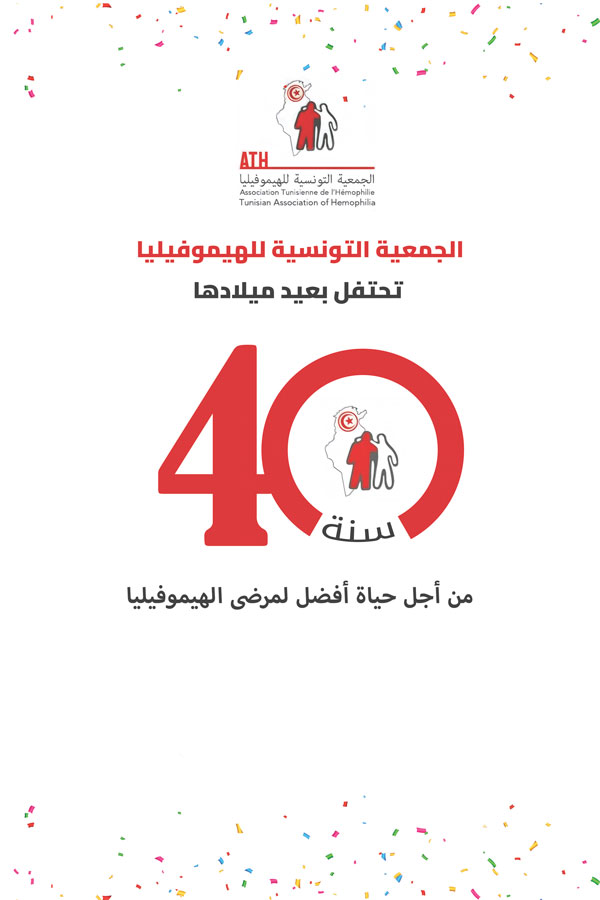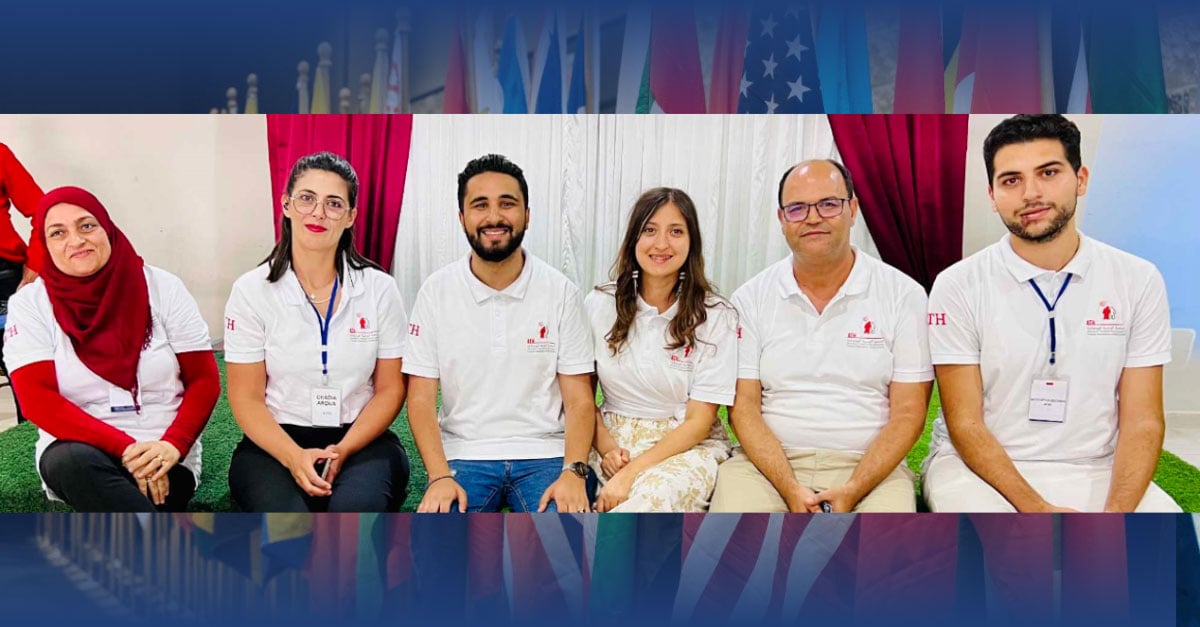NMO name | Association Tunisienne de L’Hemophilie (ATH) |
Location | Tunis |
Founding date | 1984 |
PWBDs served | 600 |
Website* |
Background
The WFH has been collaborating with the ATH since 1984. In the past, the WFH was active in the country through the Global Alliance for Progress (GAP) Program, the precursor to the WFH Path to Access to Care and Treatment (PACT) Program, and through the WFH Twinning Program. The WFH GAP Program helped strengthen the national preventive care program for patients with hemophilia (PWH), establish the NMO as a key partner, and support the setting up of the hemophilia treatment centre (HTC) at Aziza Othmana. The ATH has taken part in two Hemophilia Organization Twinning (HOT) partnerships with the Canadian Hemophilia Society (Quebec chapter), which resulted in tripling the quantity of treatment products procurement by the Tunisian health authorities among other notable outcomes. An HTC Twinning between the Aziza Othmana Hospital in Tunis and the Toulouse/Bordeaux HTCs in France helped build the capacity of healthcare professionals in terms of the diagnosis and treatment of people with hemophilia. This has enabled the Aziza Othmana HTC to be in a position to now guide and partner with the Hôpital Peltier CHU in Djibouti City, Djibouti as an established partner in the HTC Twinning Program.
The following answers from the NMO have been edited for clarity.
What are your vision and mission?
The ATH strives to enhance the quality of life for Tunisians with hemophilia and other inherited bleeding disorders, and their families.
Which services do you offer your bleeding disorders community?
We offer a range of services. Firstly, we provide adequate psychosocial support and education to promote the integration of PWBDs into society. In collaboration with healthcare providers, we ensure access to safe and effective treatments. We also engage actively in public awareness raising programs as part of our ongoing advocacy efforts. This year, we celebrate our 40th anniversary. This is a particularly important milestone for us as we have continually provided service to our community throughout the past 40 years.


“The ATH celebrates its 40th birthday. For a better life for people with hemophilia”
What are the challenges the bleeding disorders community faces in Tunisia?
The main challenges facing the bleeding disorders community in our country include barriers to accessing adequate healthcare due to the nature of our health insurance coverage. Most patients are covered but many are left without adequate care if they do not meet the eligibility criteria. Additionally, PWBDs in Tunisia often face social isolation due to their health condition, leading to emotional and psychological difficulties. For those with health complications, high medical costs and loss of income resulting from the inability to work further exacerbate the financial difficulties of PWBDs and their families.
To overcome these challenges, we inform our community members about the steps to follow to register for health insurance. We also advocate for the expansion of social coverage through awareness campaigns, petitions, meetings with political representatives, and advocacy efforts.
What are the challenges your NMO faces?
The ATH faces a constant challenge of obtaining sufficient funding. We are heavily dependent on external funding. In addition to this, the association has trouble recruiting and retaining motivated volunteers, which hampers our activities. Finally, we must regularly adapt to changes in government policies or regulations, which impact our operations and the achievement of our objectives.
To try and surmount these challenges, we work to increase our visibility through social networks and traditional media. We also collaborate with other non-governmental organizations to pool human resources and skills. We also encourage remote work to help attract volunteers and employees who are unable to physically travel.
Why did your organization join the WFH?
We joined the WFH for several reasons. Membership gives us access to a global network of experts in hemophilia and bleeding disorders, facilitating the sharing of knowledge and best practices. Our work with the WFH also supports our efforts to improve the quality of life for people affected by hemophilia worldwide.
How would you describe your experience collaborating with the WFH?
Our experience working with the WFH has been extremely positive and rewarding. We have received ongoing support which has provided us with resources, advice, and access to a global network of hemophilia experts, particularly through the WFH GAP Program and the WFH Twinning Program. This collaboration has enabled us to strengthen our capacities, develop innovative initiatives, and actively contribute to improving the care of those affected. The WFH has been a valuable partner in our mission to enhance the quality of life for people with hemophilia, and we are grateful to continue working together towards our shared goals.
As part of your advocacy work, have you tried to influence governments to achieve change in policies affecting bleeding disorders?
We have tried, and we have made important strides. Our experience suggests that it is necessary to bring key stakeholders together around the same table through the establishment of a national committee dedicated to hemophilia and other coagulation disorders to optimize the management of bleeding disorders.
Do you have any advice for other NMOs?
Our advice would be to establish strategic partnerships by collaborating with other organizations to maximize your impact. Conduct awareness campaigns to inform the public about the challenges faced by PWBDs. Also, promote the empowerment of PWBDs by involving them in decision-making, providing them with information and skills, and supporting them to become agents of change in their own lives and communities. For example, our NMO was initially healthcare professional-led, but we decided to transition to a patient-led approach. Nonetheless, we have maintained a close lay-medical collaboration which we consider key to our success.
Do you have a special message for the global bleeding disorders community?
We are all in this together. Each member of our community faces similar challenges. Together, we can surmount the obstacles in front of us, and shape a brighter tomorrow for our community.
To read about the way the WFH and NMOs collaborate to make a difference in local bleeding disorders communities, please read “National member organizations: the heartbeat of the WFH” here.
To read more stories in this series, please click on one of the links below.
NMO | Article |
Federación de Hemofilia de la República Mexicana (Mexico) | |
Asociación Costarricense de Hemofilia (Costa Rica) | |
Haemophilia Association of Mauritius | |
Syrian Hemophilia Society | |
National Hemophilia Network of Japan | |
Hemophilia Society of Malaysia (HSM) |
* Disclaimer: This is an external website, and its content has not been developed nor endorsed by the WFH.












